




1,389,899
Total Non-Emergent Medical Transportation (NEMT) trips provided in 2023 through Translink, NW Rides and Ride to Care combined
2,883
Number of patients Housecall Providers served within its three in-home programs: primary care, palliative care and hospice services
43
Number of Oregon Health Plan redetermination grants given to support member assisters and general outreach
CareOregon purchased the Rockwood Community Health Center in 2009 to serve Oregon Health Plan members without access to nearby primary care services. Since then, we successfully grew the clinic and improved access for thousands.
In March 2023 we transferred ownership of the center to Multnomah County. Though building ownership has changed hands, CareOregon will continue to partner with the county to support members served by the clinic, as well as invest in other organizations on campus that promote health and wellness.
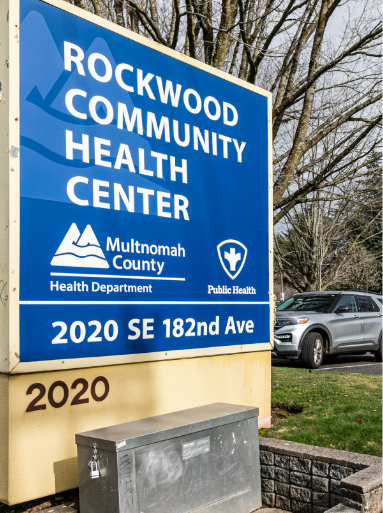
In 2023 CareOregon Dental collaborated with our Federally Qualified Health Center Primary Dental Provider Network to develop a standardized practice tool, which helps dental providers evaluate a patient's risk for developing cavities, aids in disease management and helps evaluate the impact of targeted interventions.
This tool, co-developed with dental directors from multiple community health organizations, is the first step of a multiyear strategy to improve data collection of our dental population in order to improve health in our community.

Pharmacy closures throughout the state have made it harder for CareOregon members to get their medications. To improve access, CareOregon devised an innovative program in 2023. We collaborated with several pharmacy providers to install self-serve, prescription-pickup lockers throughout our service areas. Supplied by a California-based vendor, the pickup lockers are leased and managed by pharmacy partners involved in the pilot. They became available in early 2024. This gives patients a convenient, new option to access the medications they need to be healthy.
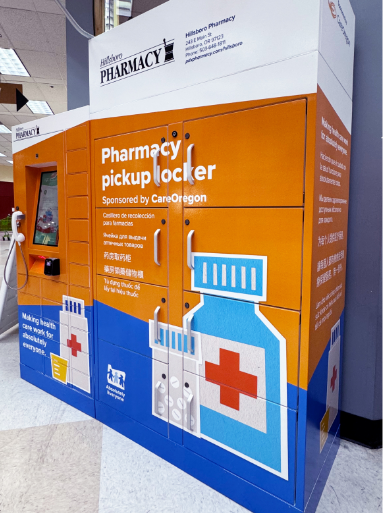

In 2023, CareOregon made great strides in reaching out to underserved communities through the Traditional Health Workers Grant Program. CareOregon completed its two-year investment of $800,000 to develop a more sustainable way to pay Traditional Health Workers (THWs), collaborating with eight community-based nonprofits: Asian Health & Service Center, Doulas Latinas, Familias en Accion, IRCO, NAYA, Our Just Future, Parrot Creek and Straightway Services.
Traditional Health Workers is an umbrella term that includes community health workers, peer support specialists, peer wellness specialists, personal health navigators and birth doulas. Research has shown that Traditional Health Workers help improve health outcomes, increase access to social supports and resources, and lead to greater overall well-being for patients.
"If you consider the populations that Traditional Health Workers serve – the historically underserved – these are folks who are likely to fall through the cracks in our very fragmented health care system,” said Ifeoma Muoto, Director of Community Health Partnerships at CareOregon. “The value of this workforce is really in promoting equity, which for many organizations, including ours, is central to what we do."
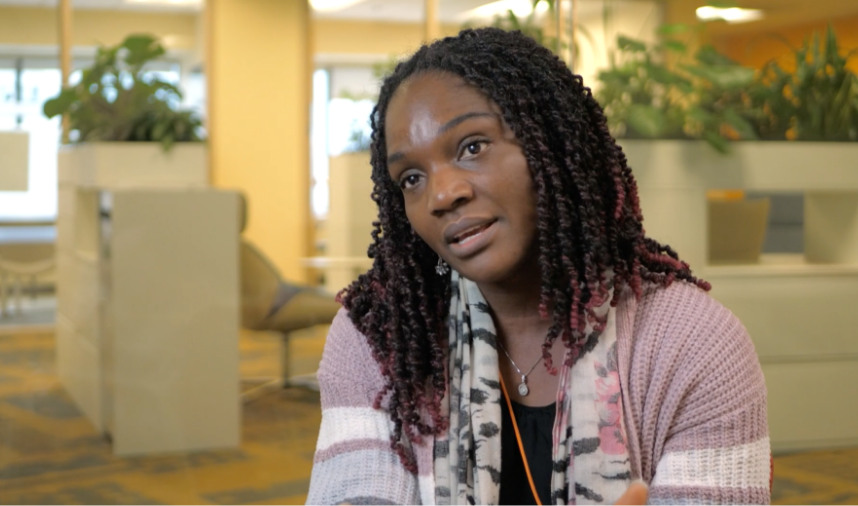
Community-based organizations often don't have the consistent funding to hire, train and grow their THW workforce. The goal of the two-year grant program was to develop a contracting approach to support payment for services that THWs provide to members and the community, reducing disparities and improving accessibility and member health.
"We have been using Traditional Health Workers for years, but grants come, and grants go,” said Holden Leung, CEO of the Asian Health & Service Center. “This grant and this partnership give hope that we can continue to build this workforce so that they really can be supported in the long term and our communities can become healthier because of it.”
CareOregon started by learning more about services these essential workers provide and the populations they serve. Participating organizations and CareOregon used this shared understanding to codesign a payment model that recognizes the unique value of Traditional Health Workers and allows our partners to grow their THW workforce.
As of December 2022, CareOregon had signed contracts with four of our community-based partners – Asian Health & Service Center, Familias en Accion, IRCO and Our Just Future – to begin to use a new payment service model.
"Developing a sustainable payment model like this is critical because Traditional Health Workers are the social health workforce,” said Amie Diffenauer, Community Programs Manager at Our Just Future. “This program really allowed us to help start to build that workforce and to really recognize it for what it is."
CareOregon will continue to learn alongside these partners how our contracting approach can help support and sustain the Traditional Health Workers workforce and improve member outcomes and experience.

Behavioral health – which refers to both mental health and substance use disorders – remains a crisis throughout the United States, and Oregon is no exception. The latest National Survey on Drug Use and Health found that 20% of Oregonians have experienced substance use disorder. And in 2023, over 35 percent of adults in Oregon reported symptoms of anxiety or depression, compared with 32 percent in the United States as a whole. Decades of systemic underinvestment in behavioral health at the local, state and federal levels have resulted in significant access challenges and health inequities in the state. CareOregon took a multi-pronged approach in 2023 to address this challenge, teaming up with community partners, leaders and organizations who are working to make services accessible to all Oregonians.
One of CareOregon’s biggest programs during the year was SHIFT (Strategic Healthcare Investment for Transformation), which puts people with behavioral health needs truly at the center of care delivery. SHIFT builds on a successful primary care model that began over a decade ago, moving toward team-based care and redesigning practices. It is designed to foster health care services that improve outcomes for patients while ensuring high provider satisfaction. This means tracking things like how easy it is for patients to get care, how satisfied they are, how involved they are in their own care and how their health improves over time.
In the fall, six diverse behavioral health agencies were selected to participate in the first SHIFT cohort: Cascadia, Clackamas County Health Centers, ColumbiaCare Services, Morrison Child & Family Services, New Narrative and VOA Oregon.
CareOregon also joined with Health Share of Oregon, Central City Concern, and Providence Center for Outcomes Research and Education to conduct a groundbreaking study that not only gives a perspective on the true size and scope of behavioral health issues but provides concrete ways to address them. Researchers analyzed claims data for nearly half a million people covered by Medicaid benefits by the Coordinated Care Organization (CCO) Health Share to look at mental health challenges, addiction and risk for homelessness. Health Share serves 82 percent of Oregon Health Plan members in Clackamas, Multnomah and Washington counties.
The study found that disorders grew modestly during the pandemic, including 5 percent more fentanyl use disorder, and recommended a roadmap for recovery in the tri-county region, including care coordination across housing, physical and behavioral health; more outpatient behavioral health and addiction treatment program capacity; and 200-250 inpatient and residential treatment beds for the severely mentally ill.
CareOregon invested $3.9 million during the year in harm reduction supply distribution in all three Portland metro-area counties, including school-based health centers. The overdose reversal drug naloxone (commonly known as Narcan) is included in every kit distributed, with the intention of reducing fatal overdoses of opioids, including heroin and fentanyl, and providing supplies to underserved communities.
In the Medford area, Jackson Care Connect CCO used several innovative strategies to address behavioral health needs.
In Northwest Oregon, the Columbia Pacific CCO brought back its community Substance Use Disorder (SUD) Summit last fall. More than 200 people attended the free, two-day event in Seaside, where they heard from 40 different speakers.
CareOregon also launched a “Recovery is possible” campaign in the fall, featuring real stories of CareOregon members and their journeys through substance use recovery. The campaign included a video series, created to reduce stigma, bring awareness to substance use recovery services and build a community that supports recovery.

Last year, we celebrated a number of milestones in our long-term efforts to address Oregon’s affordable housing crisis – a commitment rooted in our belief (and supported by research) in the connection between stable housing and health. We made substantial new investments, including buying a hotel in Seaside that we’re converting into affordable housing for community members and health care workers. And we cheered the grand opening of projects made possible by some of our first housing investments.
Our Columbia Pacific subsidiary has been at the forefront of our housing work at CareOregon. Since Columbia Pacific launched its Regional Housing Impact Fund in March 2020, it has invested more than $5 million to address housing needs in rural Northwest Oregon, including about $2 million on behalf of some of its largest clinical partners.
The result has been about 300 additional affordable housing units (apartments) in its three-county service region, which has some of the highest per-capita rates of homelessness statewide. Columbia Pacific housing grants have also supported local organizations that serve community members experiencing homelessness.
In June 2023, Columbia Pacific marked a full-circle moment when it joined with community leaders to celebrate the grand opening of Warrenton’s Trillium House. Three years earlier, the project received the first-ever grant ($400,000) from the Columbia Pacific Housing Impact Fund. The opening of Trillium House added 42 units of affordable housing in Clatsop County, which has the state’s highest per-capita rate of homelessness.
To promote housing stability and long-term self-sufficiency, Clatsop Community Action has a staff member onsite to help Trillium House residents access its services. Clatsop Behavioral Healthcare provides referrals and wrap-around services to residents of the five units reserved for households with members experiencing serious mental health challenges.
“Projects like Trillium House support people’s housing stability, so they can stay connected to employment and education opportunities, build community and take other steps to improve their lives,” said Mary Bradshaw of Northwest Housing Alternatives, which developed Trillium House in partnership with the Northwest Oregon Housing Authority.
Clatsop County is also the site of one of our most ambitious housing efforts so far. In 2023, CareOregon broke ground on Hawk’s Eye Apartments, a project to convert a former hotel into housing for two populations: low-income community members needing behavioral health supports and professionals who work for health care and social safety net organizations. The project is planned to open in late summer 2024.

“Hawk’s Eye Apartments will help address two pressing needs: affordable housing for Oregon Health Plan members and for our health care and social services workforce,” explained Leslie Ford, Columbia Pacific’s Housing Strategy and Development Advisor. “The very limited supply of affordable housing has made it difficult for our community and clinical partners to attract and keep workers.”
Ford, who has overseen the Columbia Pacific Housing Impact Fund since its launch, recently expanded her geographic focus to include Jackson County, one of several regions included in Gov. Tina Kotek’s first executive order last year declaring homelessness a state of emergency.
Ford is providing guidance and support to the team at Jackson Care Connect, part of the CareOregon family, as the coordinated care organization evaluates potential projects to support.
She has also lent her expertise and problem-solving skills to the Jackson County Multi Agency Coordination (MAC) Group – a collection of government agencies and service providers tasked with working together to meet ambitious, state-defined targets tied to Gov. Kotek’s homelessness emergency order.
The group, which includes Jackson Care Connect, exceeded targets for the addition of low-barrier shelter beds, the rapid rehousing of unsheltered individuals and families, and eviction preventions. For instance, more than 100 individuals and families were rapidly rehoused, which not only entailed finding them a place to live but also providing services to help them make the transition to more-stable housing.
“The incredible work that the MAC Group has done will likely have long-term effects on how the table is set for affordable housing in Jackson County,” Ford said.
Mission
Our mission is to inspire and partner to create quality and equity in individual and community health. Our vision is healthy communities for all individuals, regardless of income or social factors.
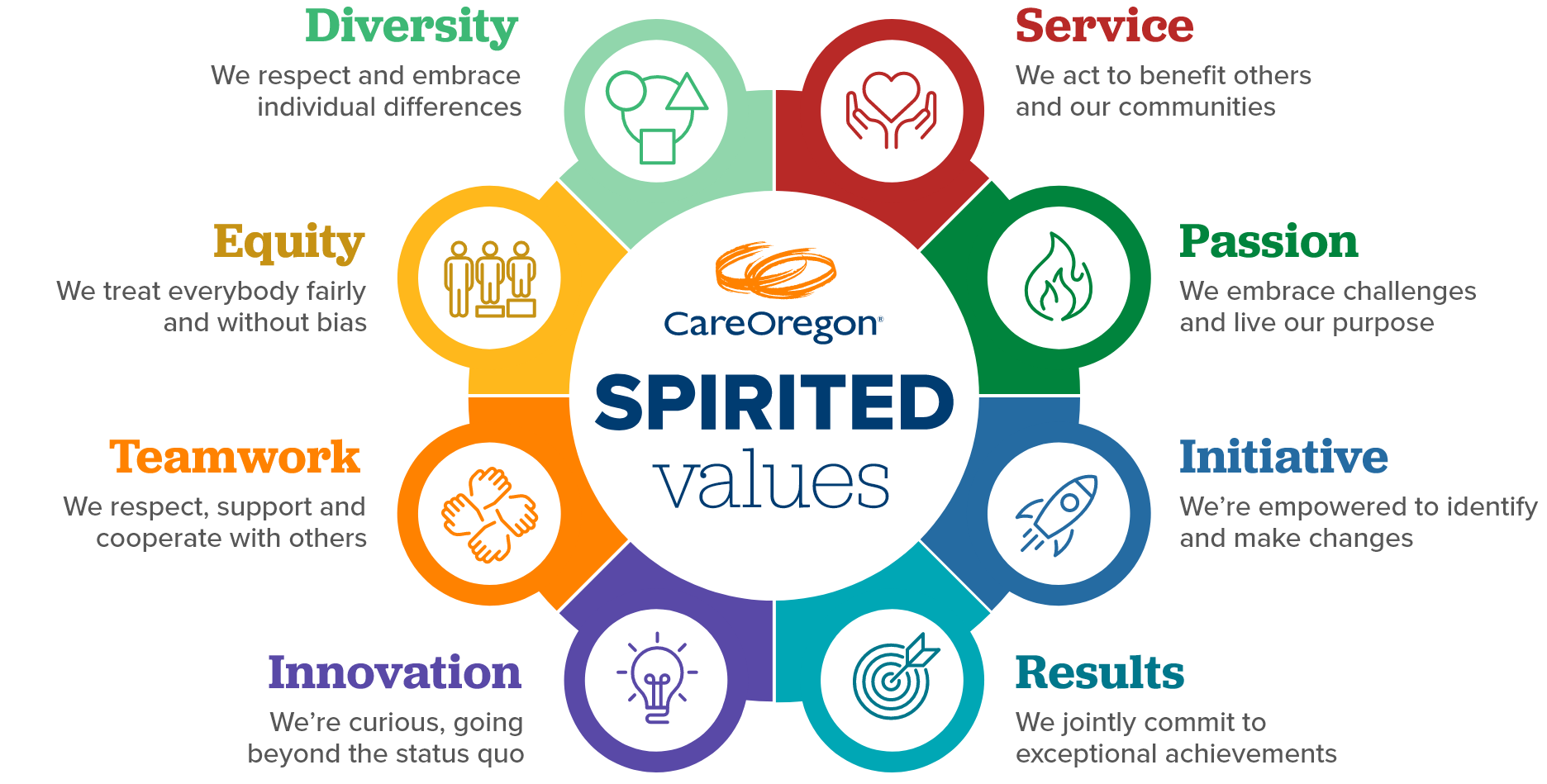
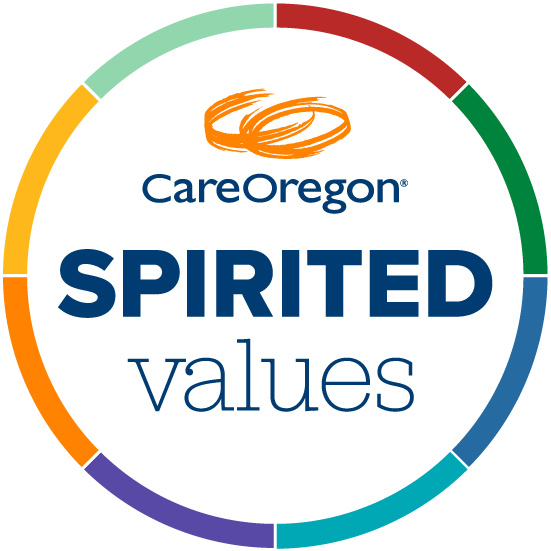
We act to benefit others and our communities
We embrace challenges and live our purpose
We're empowered to indentify and make changes
We jointly commit to exceptional achievements
We're curious, going beyond the status quo
We respect, support and cooperate with others
We treat everyone fairly and without bias
We respect and embrace individual differences
CareOregon’s positive financial performance allowed us to continue to deliver on our commitment to creating quality and equity in individual and community health. In addition to meeting the health care needs of our members, we made investments in the care delivery systems to improve access to quality care and supported initiatives to meet community-wide social health needs (housing, food, social support and education).
Our financial performance was supported by membership growth from the addition of the Healthier Oregon program in July, which offers health care coverage for people of any age or immigration status who meet the program criteria. The addition of this population offset the decline in traditional Medicaid membership due to the State resuming its Medicaid eligibility verification process. Our Medicare Advantage plan saw increases in membership, helped by our ability to maintain and enhance our CareOregon Advantage benefit package in 2023.
565,000
$2.72 billion
$1.40 billion
CareOregon and our coordinated care organizations reinvested more than $84 million in Oregon communities in 2023. The money supported health-related services, health information technology and other investments that align with our mission to support members through partnerships with locally based programs and services. This year we also partnered with the other coordinated care organizations (CCOs) and the state of Oregon to collectively invest in four organizations focused on behavioral health support in the state. These community investments were made in addition to our required contributions under the OHA SHARE Initiative.
We continue to dedicate funds to reduce health disparities. After identifying specific populations most impacted by discrimination, we worked to mitigate health risks associated with social conditions. We sought out key partners in culturally and linguistically specific organizations, as well as programs staffed by Traditional Health Workers (THW), including Community Health Workers, Peer Support Specialists and other types of THWs. While we continue to be proud of the assistance and care we offer our members, we recognize that a great deal remains to be done.
CareOregon also gave $5.3 million in charitable contributions and sponsorships to community nonprofit organizations as part of its corporate giving activities.
$52,109,009
$7,553,683
$4,316,570
$4,464,700
$35,774,056

$11,168,992
$2,696,923
$4,421,945
$695,449
$3,354,675
$16,404,164
$3,523,096
$5,704,625
$1,229,770
$5,946,673


Kerry Barnett, JD
Finance committee
CareOregon
Jonathan Betlinski, MD
Director, Division of Public Psychiatry
OHSU
Larry Didway
Superintendent
Clackamas Education Service District
Tina Edlund
Governance and Operational Excellence committee
CareOregon
Woody English, MD, MMM
Chair of the Quality and Health Outcomes committee
CareOregon
Tec Han
Chief Investment Officer
Vibrato Capital LLC
Damien R. Hall
Partner
Dunn Carney LLP
Kimberlynn Heller, DO
Partner and Co-Founder
The Oregon Clinic OB/GYN East
Susan Hennessy
Chair of the Governance and Operational Excellence committee
CareOregon
Eric C. Hunter
President and Chief Executive Officer
CareOregon
Andrew McCulloch
Finance and Quality and Health Outcomes committees
CareOregon
Jacqueline Mercer
Chief Executive Officer
Native American Rehabilitation Association of the Northwest (NARA)
Suk Rhee
Chair of the Community Impact Committee
CareOregon
Nancy Avery, Board Chair
Manager
ODS Community Dental
Jonathan Betlinski, MD
Director, Division of Public Psychiatry
OHSU
Pam Cooper
Chief Financial Officer
Providence Seaside Hospital
Sherrie Ford
Director
Columbia Health Services
Eric C. Hunter
President and Chief Executive Officer
CareOregon
Steven Manesis
Peer Support Specialist
Community Advisory Council Member
Monica D. Martinez
Vice President/General Counsel, Legal and Regulatory Affairs
CareOregon
Viviana Matthews
Executive Director
Clatsop Community Action
Erin Skaar
Commissioner
Tillamook County
Marlene Putman
Tillamook County Community Health Centers
Administrator
Joe Skariah, DO
Physician
OHSU Family Medicine
Eric Swanson
President
Adventist Health Tillamook
Lena Walker
President
Family Vision of Oregon
Nicole Williams
Chief Operating Officer
Columbia Memorial Hospital
Laura Bridges
La Clinica Health Care
Stacy Brubaker
Jackson County Health & Human Services
Jason Elzy
Housing Authority of Jackson County
Matt Hough, MD
Southern Oregon Pediatrics
Eric C. Hunter
CareOregon
Jacquie Jaquette
Southern Oregon Education Service District (SOESD)
Molly Johnson
Advantage Dental
Nora Liebowitz
CareOregon
Craig Newton
JCC Community Advisory Council
Hollie Shults
PrimeCare
Maria Underwood
La Clinica